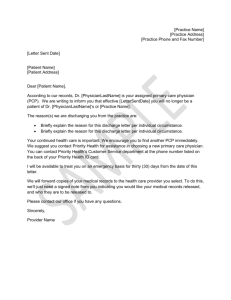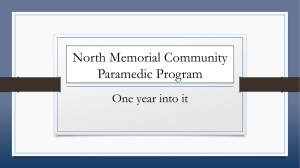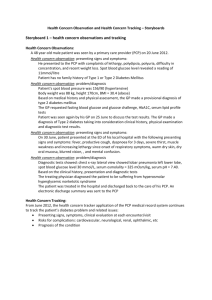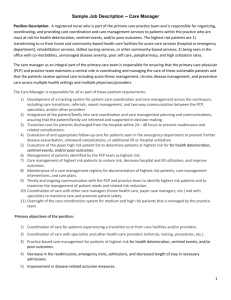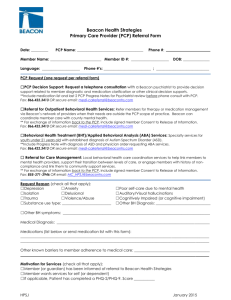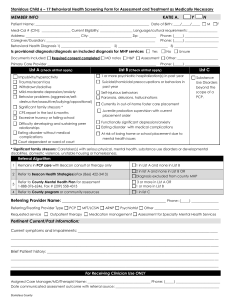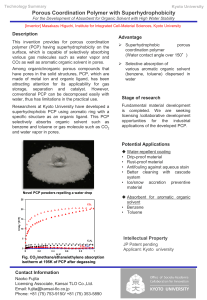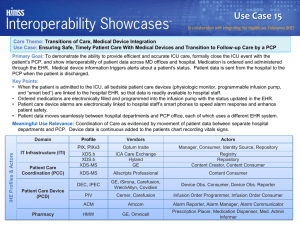PatientJourney-PCP_care-and-Types_of_CarePlan_v
advertisement
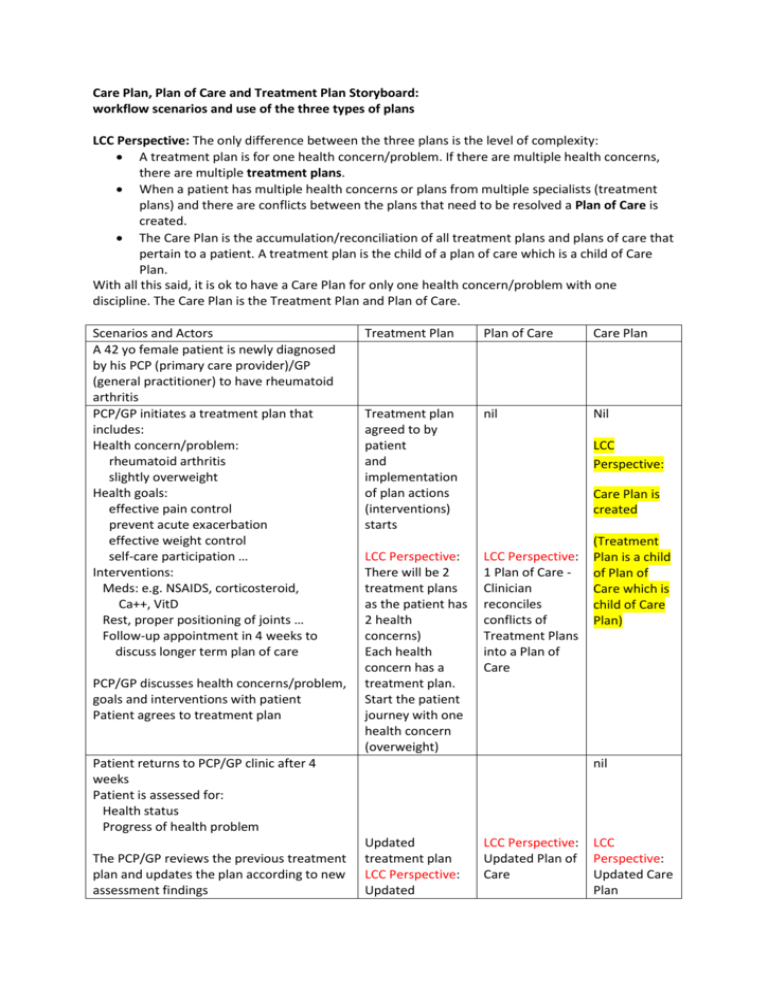
Care Plan, Plan of Care and Treatment Plan Storyboard: workflow scenarios and use of the three types of plans LCC Perspective: The only difference between the three plans is the level of complexity: A treatment plan is for one health concern/problem. If there are multiple health concerns, there are multiple treatment plans. When a patient has multiple health concerns or plans from multiple specialists (treatment plans) and there are conflicts between the plans that need to be resolved a Plan of Care is created. The Care Plan is the accumulation/reconciliation of all treatment plans and plans of care that pertain to a patient. A treatment plan is the child of a plan of care which is a child of Care Plan. With all this said, it is ok to have a Care Plan for only one health concern/problem with one discipline. The Care Plan is the Treatment Plan and Plan of Care. Scenarios and Actors A 42 yo female patient is newly diagnosed by his PCP (primary care provider)/GP (general practitioner) to have rheumatoid arthritis PCP/GP initiates a treatment plan that includes: Health concern/problem: rheumatoid arthritis slightly overweight Health goals: effective pain control prevent acute exacerbation effective weight control self-care participation … Interventions: Meds: e.g. NSAIDS, corticosteroid, Ca++, VitD Rest, proper positioning of joints … Follow-up appointment in 4 weeks to discuss longer term plan of care PCP/GP discusses health concerns/problem, goals and interventions with patient Patient agrees to treatment plan Treatment Plan Plan of Care Care Plan Treatment plan agreed to by patient and implementation of plan actions (interventions) starts nil Nil LCC Perspective: There will be 2 treatment plans as the patient has 2 health concerns) Each health concern has a treatment plan. Start the patient journey with one health concern (overweight) LCC Perspective: 1 Plan of Care Clinician reconciles conflicts of Treatment Plans into a Plan of Care LCC Perspective: Care Plan is created Patient returns to PCP/GP clinic after 4 weeks Patient is assessed for: Health status Progress of health problem The PCP/GP reviews the previous treatment plan and updates the plan according to new assessment findings (Treatment Plan is a child of Plan of Care which is child of Care Plan) nil Updated treatment plan LCC Perspective: Updated LCC Perspective: Updated Plan of Care LCC Perspective: Updated Care Plan treatment plans Patient is also assessed for Longer term management needs including Needs for other professional care services Rheumatologist Physiotherapist Occupational therapist Dietitian Pharmacist Clinical psychologist Social worker, etc Plan of care for management of complex health problems The PCP/GP develops a plan of care for management of the patient’s complex health concerns/problems arising from the rheumatoid arthritis Referral to other health care providers The patient agrees with the longer term plan of care and referrals to other health care professional as recommended by PCP/GP LCC Perspective: Plan of Care is created when 2 or more treatment plans need to be reconciled) + referrals The patient makes appointment with and is seen by the following health care professionals / specialist for assessment and care: Rheumatologist Physiotherapist Occupational therapist Dietitian Pharmacist Clinical psychologist Social worker, etc nil Discipline specific treatment plans Each health care professional/specialist identifies one or more health concern/problem from his/her perspective, discusses discipline specific treatment plan with the patient The treatment plans are accepted by the patient (some with modifications) LCC Perspective: or Plans of Care (depending on # of health concerns per specialist) Each health care professional/specialist produces a progress report that includes relevant components of treatment plan to be sent to patient’s PCP/GP Progress notes (with treatment plan components) to PCP/GP LCC Perspective: Care Plan is updated Discipline specific plan of care Progress notes with treatment On subsequent visits, individual health care professional/specialist may discuss with the patient the need to establish plan of care to better manage the health concerns e.g. the rheumatologist may consider the need to develop a longer term plan of care to decelerate the arthritis progression and to prevent acute exacerbations On follow-up visit by the patient, the PCP/GP reviews with the patient progress notes from other healthcare professionals/specialists PCP/GP revised plan of care according to these inputs PCP/GP also generates a new treatment plan based on the updated plan of care. The treatment plan contains specific actions such as ordering new diagnostic test(s), adjust meds dosage, prescribe new drug, etc The PCP/GP also decides that the complexity of the patient’s health concern/problems and the number of health care professionals/specialist sharing the care of the patient requires a tool to better coordinate the shared care The PCP/GP discusses with the patient the benefits of establishing a multi-disciplinary care plan The patient agrees with the suggestion and works with the PCP/GP to generate the initial care plan The patient works with the PCP/GP to invite the team of health care professionals/specialists involve in the care of the patient to further develop the health concerns/problems, health goals and interventions from multi-disciplinary and patient perspectives Relevant components of plan of care from different healthcare professionals/specialists are brought together and harmonized into the multidisciplinary care plan: The health concerns/problems, health goals and interventions are prioritised Barriers and risks are identified and mitigation strategies agreed upon and plan of care components to PCP/GP LCC Perspective: Treatment Plans and Plans of Care need to be reconciled Revised PCP/GP plan of care New treatment plan based on revised plan of care Generate Care Plan Harmonization of discipline specific plan of care components into Care Plan Development of multidisciplinary care plan
